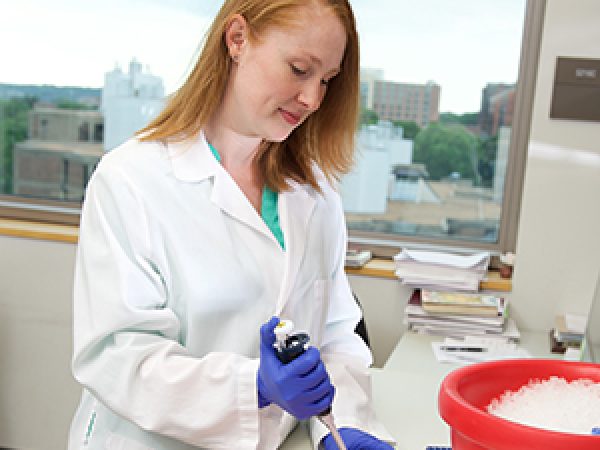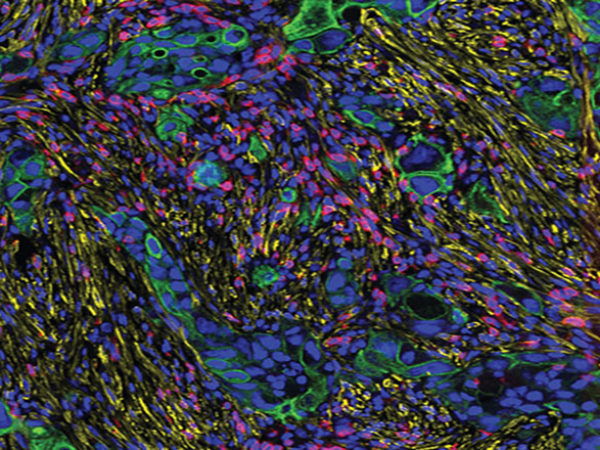Forging a Path as an Advocate for Glioblastoma Research
“It is more important to know what sort of person has a disease than to know what sort of disease a person has.” — Hippocrates
The disease: Glioblastoma, the most lethal form of brain cancer, killing most people within 18 months of a diagnosis.
The person: Adam Hayden. A writer, philosopher, husband, father, and patient advocate. He was diagnosed with glioblastoma in 2016. As he marks the seventh anniversary of his diagnosis, Hayden provides researchers and fellow patients alike with a rare and valuable perspective on long-term survival of glioblastoma.
Hayden, age 41, is a veteran of the AACR’s Scientist↔Survivor Program. He has become a relentless advocate for brain cancer research, visiting the White House last week as part of President Biden’s Cancer Moonshot initiative. Earlier this month, he lobbied lawmakers for increased funding for cancer research on behalf of the National Brain Tumor Society.

Hayden is frank about the poor survival statistics for glioblastoma. He knows he is fortunate to be healthy enough to travel, to work, and to juggle parenting duties. The surgery, radiotherapy, and chemotherapy he underwent following his diagnosis left him with some physical impairments, as well as fatigue and seizures. However, his only current medical treatment is an anti-epileptic medication, and regular MRIs show that his brain tumor is stable.
Hayden can appear tireless. He writes about his disease on his blog, titled Glioblastology. He served on the board of OurBrainBank, a nonprofit that launched an app for patients with glioblastoma to track their symptoms. He advised the developers of Roon, a mobile app that provides medically vetted short videos on glioblastoma, and in his dynamic, energetic style, appears in dozens of videos, tackling topics from what radiation feels like to whether it’s OK to cry when talking to your children about cancer.
The children: Hayden and his wife, Whitney, have three sons who are now 11, 9, and 7. This month, 11-year-old Isaac joined his parents in Washington, D.C., meeting with lawmakers to share their story and advocate for improvements to federal benefit programs and improved clinical trial protocols, in addition to increased funding.
“For our family, advocacy has been empowering,” Hayden said. “Many researchers don’t meet patients who are the ultimate beneficiaries of their work; legislators don’t always get the personal stories behind legislation; and many clinicians don’t have the time during office visits to hear the lived experience of patients within their care.
“Creating opportunities for our family to tell our story with these audiences reinforces the idea that we can take this disease on our terms, and we’ll use the difficult diagnosis to hopefully improve the outcomes of the next family that receives the devastating news of a brain cancer diagnosis.”
Hayden has previously shared his story with the AACR’s Cancer Today magazine and in an AACR Patient Advocate Forum on the science of cancer survivorship. You can follow his robust Twitter feed at @adamhayden.
The AACR supports a wide range of research on glioblastoma and other forms of brain cancer. From October 19 to 22, the AACR Special Conference: Brain Cancer will take place in Minneapolis. This conference will highlight innovative ideas and recent advances in brain cancer research, with the ultimate goal of helping researchers develop novel therapeutic and prevention strategies for both primary and secondary brain cancers.
Last year, AACR journal Cancer Discovery and the AACR’s Science Policy and Government Affairs office convened a panel discussion on the latest efforts to find cures for brain cancer. The editors of the AACR journals curated this collection of articles on brain cancer research.
The AACR also funds research on brain cancer. Current grants include the AACR-Sontag Foundation Brain Cancer Research Fellowship, which supports a postdoctoral or clinical research fellow while conducting a mentored project on brain cancer. A partnership between the AACR and Novocure has supported numerous career development awards, as well as grants in the emerging area of tumor-treating fields. Past grants have supported research on pediatric brain tumors and vascular detransformation as a potential therapeutic strategy. For more information on the AACR’s initiatives on brain cancer, please see our website.



